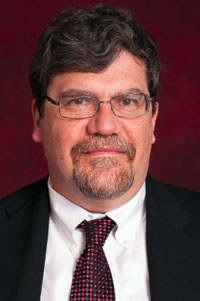Continuous Pharmaceutical Manufacturing: The Engineer's Turn
Dr. Fernando Muzzio
Distinguished Professor of Chemical Engineering Rutgers University, USA
3:30pm - March 19, 2015
ETLC 1-001
Host: Dr. Suzanne Kresta
Abstract:
Up to the present time, manufacturing of pharmaceutical products is a batch enterprise driven by recipes and dominated by empiricism. Pharmaceutical manufacturing processes are approved by FDA and other regulatory agencies based on a company's ability to demonstrate reproducible manufacturing, typically by making a small number of product batches conforming to specifications. Once a product recipe (the "formulation") and a process specification (the "validated process") is developed for achieving such an outcome, it is only changed when quality issues arise. The development is empirical by nature, assisted, in the last ten years, by a growing use of designed experiments and statistical analysis. Model-based process optimization and model-predictive control have been rarely used, largely because the intrinsic batch nature of traditional manufacturing processes makes application of such methods very difficult.
However, in the last few years, the pharmaceutical industry has developed a rapidly growing interest in continuous manufacturing methods. This evolution, driven by academia, the FDA, and leading companies, is rapidly becoming a central development goal of the industry. Continuous processes operate close to steady set points, and are therefore much more amenable to process modeling and modern control methodologies. However, implementation of these methods require also a transition in the de development toolbox, away from the traditional industrial pharmacy methods, and toward the engineering methodologies, including the development of predictive models, that have proven successful in many other industries.
In this talk I will compare the traditional batch processes to their emerging continuous counterparts. Subsequently, I will introduce integrated process modeling methods developed by our group in the last 5 years, and will demonstrate their use for design, optimization, and control of manufacturing processes. I will describe also the main research needs and development opportunities that remain open as continuous manufacturing platforms are developed and implemented.
Biography:
 Fernando Muzzio is a Distinguished Professor of Chemical Engineering at Rutgers University. For the last 22 years, pharmaceutical product and process design has been Professor Muzzio's main research and educational focus. His research interests comprise continuous manufacturing, powder mixing, powder flow, segregation, compression, mixing and flow of liquids and suspensions, capsule filling, tablet dissolution, and tablet coating. In the last ten years, his main research focus has been the development of continuous systems for solid dose manufacturing. He is the author of over 250 peer-reviewed scientific articles, book chapters and patents, and several hundred lectures at technical conferences, companies, and universities in areas relevant to the pharmaceutical industry. He is a frequent advisor and lecturer at FDA events, and in 2010 he was appointed a voting member of the FDA committee on Pharmaceutical Sciences and clinical pharmacology.
Fernando Muzzio is a Distinguished Professor of Chemical Engineering at Rutgers University. For the last 22 years, pharmaceutical product and process design has been Professor Muzzio's main research and educational focus. His research interests comprise continuous manufacturing, powder mixing, powder flow, segregation, compression, mixing and flow of liquids and suspensions, capsule filling, tablet dissolution, and tablet coating. In the last ten years, his main research focus has been the development of continuous systems for solid dose manufacturing. He is the author of over 250 peer-reviewed scientific articles, book chapters and patents, and several hundred lectures at technical conferences, companies, and universities in areas relevant to the pharmaceutical industry. He is a frequent advisor and lecturer at FDA events, and in 2010 he was appointed a voting member of the FDA committee on Pharmaceutical Sciences and clinical pharmacology.
Professor Fernando Muzzio is also the director of the National Science Foundation Engineering Research Center on Structured Organic Particulate Systems. The center, which has a life span of 10 years and a total budget in excess of $8 million per year, focuses on pharmaceutical product and process design, with special emphasis on continuous manufacturing, particle engineering, and personalized medicine. FDA and 45 companies are currently members of the center, including 10 of the top 15 pharmaceutical companies in the world, and many world class technology suppliers in the equipment, instrumentation, software, and control industries.
Professor Muzzio is a consultant to 50+ companies, including most of the large pharmaceutical companies, as well as many other industries, including chemical, petroleum, polymers, food, consumer products, catalysts, manufacturing equipment, software, and construction materials. His consulting practice includes product and process design, use of statistical methodology for product and process optimization, materials characterization methods, and strategic research and development planning. He has also organized numerous training courses at companies, including Pfizer, Merck, BMS, J&J, Sepracor, Allergan, Eli Lilly, Mallincrodt, Haldor Topsoe, USB, and ILC Dover.
Professor Muzzio is also the president of Mixing Consultants Inc, a specialty consulting company focused on providing scientific and technical support in the general applications of mixing science and technology.